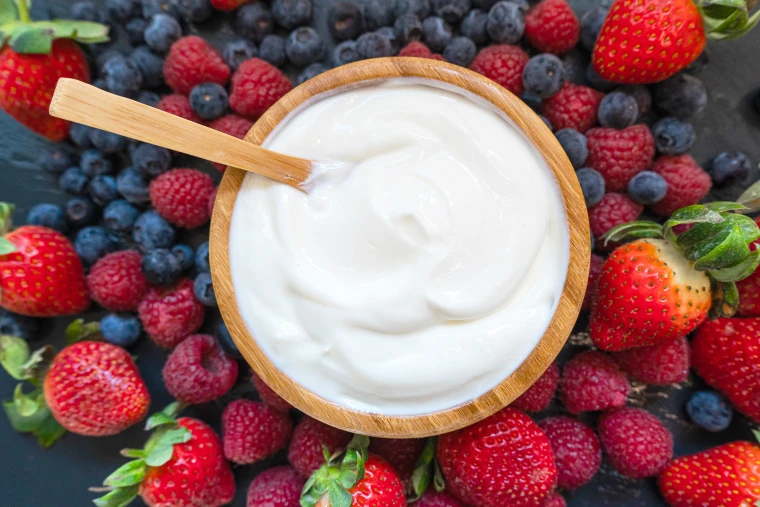Bad breath? Certain types of probiotic bacteria may help, research suggests
Probiotics found in fermented foods like yogurt, sourdough bread and miso soup might neutralize the gaseous blends of sulfur produced by mouth bacteria.

Greek yogurt in a glass jars with spoons,Healthy breakfast with Fresh greek yogurt, muesli and berries on background
When it comes to persistent bad breath, the types of probiotic bacteria found in fermented foods like yogurt, sourdough bread and miso soup may help ease the offending odor, a new study suggests.
An analysis of previous studies revealed that certain bacteria taken as supplements, including Lactobacillus salivarius and Lactobacillus reuteri, could help freshen breath, according to the report, published Tuesday in BMJ Open.
Bad breath, or halitosis, “is the third most common disease for patient referral to the dentist, only ranking behind [cavities] and periodontal disease,” the Chinese researchers write.
A major cause of persistent bad breath is gaseous blends of sulfur and other elements, known as volatile sulfuric compounds, that are produced by mouth bacteria, the researchers note.
Would it be possible to neutralize the effects of those compounds?
To take a closer look at whether probiotic bacteria might help manage bad breath, the researchers scoured the medical literature for studies on the topic. Ultimately, they found seven clinical trials that involved a total of 278 people ages 19 to 70.
Bad breath severity in the trials was assessed by measurements of thecompoundsdetected in the mouth, along with a score that indicated how strong the bad breath odors were at various distances from the mouth.
When the researchers pooled the data from the seven studies, they found the compounds that are linked to smelly breath declined significantly in participants who consumed probiotics, compared to those who were given placebos. The improvements weren’t permanent, however, lasting about four weeks.
While the findings were encouraging, the researchers note that the original studies were fairly small.
“More high quality, randomized clinical trials are required in the future to verify the results and to provide evidence for the efficacy of probiotics for the management of halitosis,” they said.
The findings make sense, said Dr. Alessandro Villa, the chief of oral medicine, oral oncology and dentistry at the Miami Cancer Institute at Baptist Health South Florida. What’s not known is whether substituting actual foods like yogurt or pickles will have the same positive effect as taking a supplement.
It would be reasonable for a person with bad breath to run a short experiment — for a week or so — to see whether consuming such fermented foods could make a difference, Villa said.
Fermented and probiotic foods are made up of beneficial live microorganisms, but it’s important to know what types of and how much bacteria they contain, said Dr. Martinna Bertolini, an assistant professor in the department of periodontics and preventive dentistry at the University of Pittsburgh.
“One thing to consider is that the consumption of dairy products in order to include a probiotics rich diet may also lead to an increase in carbohydrates and sugars consumption and lead to increased accumulation of plaque and biofilm,” Bertolini said in an email.
Nutritionist Perri Halperin said people with persistent bad breath should see a dentist for potential underlying health issues.
“It could be indicative of health issues that are not necessarily dental issues,” said Halperin, the clinical nutrition coordinator at Mount Sinai Hospital in New York.
Among the possible causes of bad breath are:
- Gum disease
- Cavities
- Certain foods, such as garlic
- Issues with the tonsils
- Kidney disease
- Severe diabetes
- Dry mouth
Dry mouth, a condition in which the body doesn’t produce adequate saliva, can result from poor hydration, as well as medications, such as some of those used to treat high blood pressure and diabetes, Villa said.
The articles on this website are for reference only and do not replace medical diagnosis or treatment. Please do not follow them on your own
Make a question

If you have any questions, please contact us via contact information, or fill in the form below.
Schedule a consultation appointment with the doctor
Before you leave, leave your information so we can send you medical news that may be of interest to you..

The doctor does not have an appointment scheduled, please choose another day

Note: The appointment time is only approximate, T-Matsouka will contact to confirm with customers after receiving the examination schedule information. Thank you for waiting for a response from T-Matsuoka.






Star rating:
Sort by :
No reviews yet.